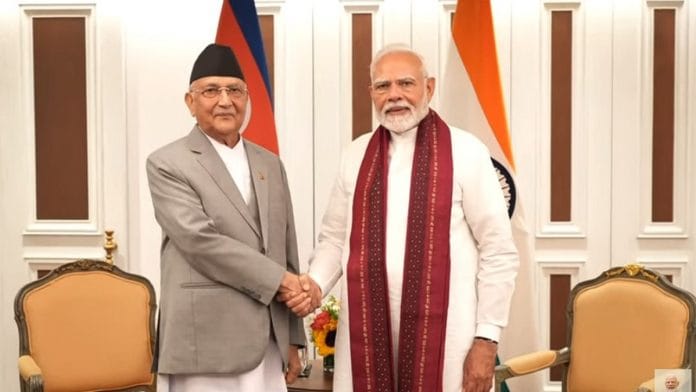New Delhi: India dismissed Nepal’s claims over Lipulekh pass in Uttarakhand Wednesday after a miffed Kathmandu urged New Delhi to not “undertake” any border activities in the area. Nepal had, earlier in the day, laid claim to the region, urging both India and China to not conduct any border trade through the pass.
“As regards territorial claims, our position remains that such claims are neither justified nor based on historical facts and evidence. Any unilateral artificial enlargement of territorial claims is untenable,” Randhir Jaiswal, the official spokesperson of the Ministry of External Affairs, said in a statement.
“Our position in this regard has been consistent and clear. Border trade between India and China through Lipulekh pass commenced in 1954 and has been going on for decades. This trade had been disrupted in recent years due to Covid and other developments, and both sides have now agreed to resume it,” the statement added.
Kathmandu in 2020 had passed a constitutional amendment, redrawing its map to include Lipulekh, Kalapani and Limpiyadhura as part of Nepal—a position that India has rejected.
In its statement Wednesday, Nepal’s foreign ministry said that it is “clear that the official map of Nepal has been included in the constitution of Nepal, and that the map shows Limpiyadhura, Lipulekh and Kalapani east of the Mahakali River as integral parts of Nepal”.
It added: “It is also known that the Nepalese government has been urging the Indian government not to undertake any activities such as road construction/expansion, border trade in the area. It is also known that the friendly country China has been informed that the area is Nepali territory.”
The latest irritant in ties between New Delhi and Kathmandu comes days after Indian Foreign Secretary Vikram Misri visited the Himalayan nation to reboot ties. K.P. Sharma Oli, the prime minister of Nepal, is expected to finally make his visit to India in mid-September. The visit is set to be Oli’s first since returning to office last year.
The delay in Oli’s India trip has been significant, given the traditionally close bilateral ties between both countries. He paid an official visit to China in December last year, and is set to visit China a second time this year for the Shanghai Cooperation Organisation (SCO) Heads of State summit before travelling to India later in September. The expected date for the visit to India is 16 September.
Thaw in India-China ties
Nepal’s statement comes after India and China agreed to work together to resume trade at the border posts at Shipki La, Nathu La and Lipulekh passes. The border trading posts were originally closed amid the COVID-19 pandemic, and later remained shut due to the tensions between the two neighbouring countries after the Galwan clashes.
In recent months, ties between India and China have seen a thaw, with Chinese Foreign Minister Wang Yi visiting New Delhi earlier this week for the 24th round of Special Representative talks on the boundary question.
Wang Yi’s visit saw the two countries agree to build their ties based on the 2005 boundary agreement—a substantive shift in diplomatic posturing between New Delhi and Beijing. Since the military clashes in Eastern Ladakh in 2020, India has maintained that peace and tranquility at the border is essential for discussions on other areas. However, the 2005 agreement bifurcates the boundary question from the larger ties.
By agreeing to the 2005 agreement, India and China have given a flip to its ties. It comes at a time when India and the US have hit a rough patch in their strategic partnership. US President Donald Trump has criticised India’s continued purchase of Russian oil, and imposed an additional tariff of 25 percent on New Delhi, which is set to come into force later this month.
Trump has also been increasingly frustrated at the stalled negotiations for a bilateral trade agreement between India and the US. The next round of negotiations, scheduled for 25 August, will likely be rescheduled for a later date.
Prime Minister Narendra Modi is set to visit China on 31 August for the SCO summit. The visit will be Modi’s first visit to China since 2018.
(Edited by Mannat Chugh)
Also Read: After Doval-Wang talks, India & China agree to go back to 2005 agreement. Why it matters






